
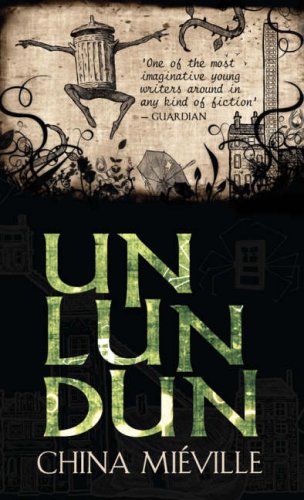
Un Lun Dun is such a gripping novel. Two young twelve year old girls, Zanna & Deeba, discover a world one night; one to which they were very surreptitiously drawn to by strange occurrences, where the city of London has a duplicate (of sorts). The city and it populace defy any norm. The inhabitants and the surrounding denizens are the second hand creations of a world where the effluvia of the modern city is used to create its somewhat run down and rag tag twinned double. UnLondon is well aware of London's existence, London is blissfully unaware. This unlikely duo's entrance is met with reverence and awe. For it seems that Zanna is the Schwazzy - a saviour - prophesied to saved the city from an evil that was spawned in London. However, things do not turn out as expected in this young adult adventure. In fact, a lot of things go wrong. UnLondonn faces challenges that it is unprepared for because a sentient evil called the Smog looks to choke, destroy and consume all. Brought up to date after a set of hair raising and near fatal encounters the girls are given the history of the city by a group of ivory tower do-gooders: the Prophiseers. The sheer sense of exuberance and wackiness that pumps through the five hundred pages of this modern fantasy is beguiling. Littered (Ha!) throughout the novel are so many different inventive characters such as martial arts dustbins known as Binjas to streets where carnivorous giraffes feast on the unlucky whom they ambush and devour. Some nice touches are technology that is utilised to build up the urban landscape of this nether land; MOIL - "Mildly Obsolete In London", and a capricious bridge controlled by the Prophiseers that is both everywhere and nowhere. His play with words also has a charming pique. Words and phrases are given a sly twist, nothing is as it seems. In fact it is overly simplified yet not dumbed down for the reader to appreciate. His sense of humour and sparse use of well maintained neologisms such as "moolaphage" brought smiles to my face. This novel's charm is its accessibility to both young and old. Aimed primarily at the young adult audience this slice of adventure serves up a fast paced original fantasy that can be enjoyed by all.

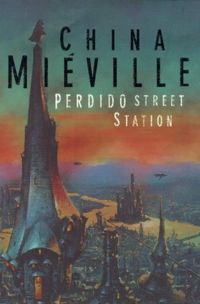
Perdido Street Station is one of those novels that offers a reader a glimpse into a world akin to our own and so very unlike our own. On offer is the wonderfully detailed and enthralling decadent and decrepit city of New Crozubon. This teeming metropolis is awash with all the trappings and lures of any modern big city and into it a stranger named Yagherek, a garuda whose has had his wings removed for committing a crime which he does not reveal, is seeking out a scientist. This clipped birdman wants to fly again. From the initial pages we are elegantly dipped into a city which possesses all the charm of a cesspit to the unwary traveler. The scientist, Isaac Dan der Grimnebulin, is a man whose brilliance is well known but whose dilettante mannerisms have hampered his career. He is involved in an inter species relationship with a khepri (beings possessing female bodies and insect heads) named Lin. The birdman comes with gold, plenty of gold, to procure the services of the scientist, quickly he succeeds in obtaining his services. This sets into motion the unleashing a nightmare that the city has no ready made defence against.
Isaac needs to study birds and the mechanics of flight: so he hires an underworld figure to obtain as many varieties of winged species as soon as possible. His lover, Lin, is hired by a very dangerous underworld figure named Mr. Motley to immortalize him. She is sworn to secrecy and it is with this plot nuance that Isaac is given copious time to bring succor to Yagherek. However, the novel and its ensuing plot isn’t as simple providing such a linear storyline.
A government official steals a specimen. It is a colourfully decorated caterpillar. It ends up in Isaac’s laboratory and possession. No matter what Isaac does, the caterpillar refuses to digest anything it is offered. This is when Isaac is introduced to a powerful hallucinogenic called Dreamshit. The reason for this narcotic being introduced is tied in with the caterpillar’s rescue from starvation. Isaac discovers that the caterpillar greedily devours and grows at an apparently accelerated create when fed this narcotic. It would have better for all is the creature had been left to die.
During the long process of trying to help the garuda attain flight, Isaac has a momentary nervous breakdown and releases all his feathered specimens at the same time. This enrages Yagherek but Isaac manages to mollify the garuda. Unfortunately and unobserved, the caterpillar pupates into a creature that inhabits the darkest recesses of terror – a Slake Moth! This creature cannot be killed by any conventional means and its feeding habits spells disaster for New Crozubon. It escapes and in turn helps to free some of its brethren from the government that watches over the denizens of the city with an ever watchful eye. The nightmare has begun.
It is soon to become apparent to those who become aware of the situation that the prognosis spells death to every sentient being. This involves all the various species inhabiting New Cozobun: humans, khepri, Remade and cactacae. The government has a host of allies to call to aid it in its quest to rid the city of the newly unleashed monsters and one memorable scene has them opening up a portal to hell and being refused. This in turn forces the officials to call upon a most unusual and bizarre ally known as The Weaver. This magnificently realized creature is a very large spider only capable of communicating via riddles possessed with a penchant for gewgaws. It reviews the situation set before the city and offers its capricious aid. Isaac and his nearest friends learn of the Slake Moths and seek to rectify the calamity now beset upon the city. Aid comes to them in many shapes and forms and it is with a growing sense of dangerous trepidation against a foe that is nearly indestructible that this newly assembled hodge-podge sets to work.
What one expects to discover when they read any piece of escapist literature which offers a world easily understood yet alien to our own is created in abundance by China Mieville. The city is described with touches that threaten to fur your tongue when the miasma of its less than salubrious neighbourhoods is traversed. The terror the Slake Moths induce is palpable and gave me bad dreams on two separate nights after I finished the book. The characters populating the pages of this novel are as real as any author could hope to breathe life into. I honestly cannot find any weakness in this novel. Superbly written, gorgeously created, dark and menacing, mysterious and non linear, Perdido Street Station is a compulsory purchase.

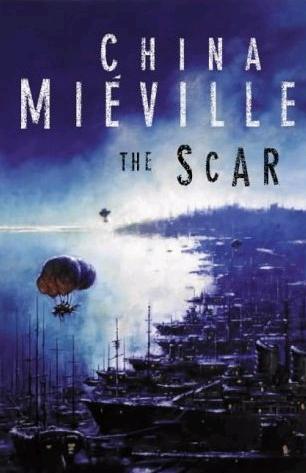
The second book in the Bas-Lag trilogy diverts from the horror and sense of imminent foreboding that Perdido Street Station regaled me with. Set in the same world as the previous novel this book can be most definitely read without any knowledge of what occurred in the previous book. An expert linguist seeks to escape from the city of New Crozubon for reason that are withheld for a large period of time. Miss Bella Bloodwine is a cold, tough, wilful and frightened woman. She finds passage aboard a ship heading to the colony of Nova Esperium, a ship loaded with prisoners hidden below deck. One of these prisoners will in turn play a series of minor parts that neatly knit the novel's storyline together when it appears to begins to fray. After a quick detour where her skills as an interpreter are pushed, the ship on which has luckily earned her passage takes aboard the stranger Silas Fennec. This man's arrival spells trouble for Bellis as he brings about a very untimely course correction - back to New Crozubon. Things go from bad to worse when on their way back to port the ship is attacked by a group of legendary pirates and commandeered. Bellis is brought to the pirates' floating city named Armada and informed that she will spend out her days on this floating city. Life keeps getting tougher for our would be fleer. Life on Armada lacks a certain believability for me. The city, a conglomeration of interconnected ships housing different communities, stretches credulity to a degree I was not going to accept. This irksome plot twist somewhat soured the book for me, however, the characters aboard this city recompensed generously. Overseeing the quotidian running of this city are The Lovers. This couple are unabashedly portrayed as an enigmatic paradigm courting favour with all the dissonant groups under their governance. As Bellis resigns herself to life with her fellow Armadans she keeps the spirit of a miraculous rescue buried deep and tries to understand what it is that keeps the Armadans together. This coupled with her fascination for a master swordsman, who acts as The Lovers bodyguard, named Uther Doul; her pity and loathing for the naturalist Johannes Tearfly; and her deep friendships with a newly freed Remade named Tanner, and a cabin boy by the name of Sheckel. Ambitious in the desires, only the higher echelons of the Armadans know the reasons for their increased resource usage and drive to visit an island inhabited by the blood sucking anophelii. Some of the novel's most terrifying scenes take place on this island. Having procured the service a male anophelii (harmless vegetarian with unfortunate facial dimensions) the final piece of a long thought out plan is finally set into motion - the summoning of an Avanc! The Avanc is a creature of fable and fantasy, or so was once believed. Bella learns of this madness to attach an harness fathoms deep to a creature which in turn will power the city to a great wound on the planet known as The Scar. Behind the scenes many subplots are bubbling with news and development of this unheard hubris. Silas Fennec is a spy, who with the aid of a magical statue manages to infiltrate many off-limit ships. The pace of this novel is a little on the slow side punctuated by brief yet very tangible episodes of terror and suspense. It is little heavy on the dialogue with a fudged explanation on how a pirate city is hold together annoying. The characters are fleshed wonderfully, combining a swashbuckling pathos imbued with a need for self preservation. The human condition and the demon condition and the Remade condition is very well expounded upon. Marine life and the depths to which everything is slowly revealed is a trifle treacly in its delivery, but I enjoyed reading The Scar more for its sense of scale than for anything else. Unfortunately, the ending goes out on a whimper after so much taut intensity is rendered in its delivery. Special mention must be given to the letters that Bellis writes to some unknown recipient. Recommended, don't expect it to be as good as Perdido Street Station.

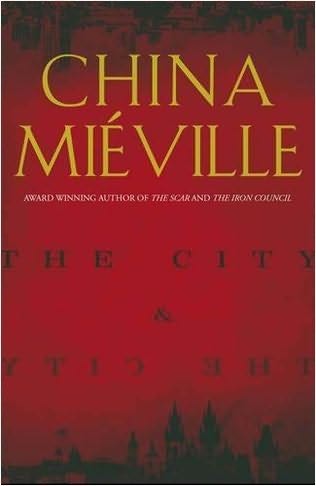
When the body of a young woman is found dumped it is up to Inspector Tyador Borlú of the Extreme Crime Squad to solver her murder. Set in the fictional city of Beszél this fantasy crime thriller sets the scene for a very protracted unraveling of how the newly deceased, and her work, brought about her untimely end.
Let us start with the fantasy element of this novel. Beszél is a city in which another city, Al Qoma, coexist. Both cities inhabit the same space and time with one another but the citizens of these two cities are taught from a very early age to unsee the other. Imagine living in a city where the quotidian routine involves ignoring the shadowy outline of those who are within walking and talking distance. It is extremely easy to stray into the alter city by accident, but to do so is known as "Breach". Those who breach for their own benefit are usually never heard from again. Both sets of citizens are dutifully aware of the consequences. The history of this shift in reality heralds back to a time called Pre-Cleavage (no intentional pun there I assure you) when the cities bifurcated for no reason expounded upon in the novel. This is one of Miéville's shortcomings in this particular novel, characters and events often do not have enough of a backdrop or background to evoke a sense of empathy, wonder, or attachment, for city or citizen.
As the novel very slowly continues it become clear that this storyline is to be of a detective overcoming stumbling blocks put before him by interested parties who don't want him to succeed - it is somewhat formulaic in its progression. Detective asks some questions, detective and sidekick get some answers, detective asks some more questions, detective follows on some leads, detective gets as many answers as new mysteries unfold in the investigation. Slowly done but well written nonetheless. The characterisations are somewhat to be desired in this plot-driven storyline so don't expect deep personal revelations or triumphs of the spirit as our detective finds himself searching for the murderer in the city of Al Qoma. All leads lead to this twin city, and all leads lead him further and further onto paths he would have preferably avoided.
I will confess to this, I read this moderately short novel in a short period without ever feeling any affectation for the characters. The lead detective is a very taciturn individual whose coherent focus and cynical mannerisms made him very much a polished though uninspiring protagonist to follow. If I were to sum up this novel with one word it would be "unfulfilling", clever, very original, but unfulfilling. Still, crime novels are not my cup of tea and I can't help but feel that no matter what the author provided I would have not found this tale suitable to my tastes. However, special mention must go to how the lead character brandishes his own justice and how in turn he is dealt with in the final chapters of The City & The City. Add half a point to my score below.

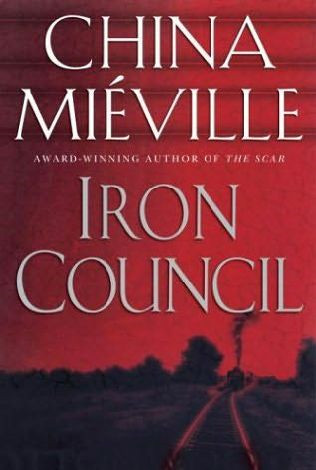
I will be very concise with this review. Iron Council is a novel which fails to live up to its initial promise - dull, very dull, oh so very dull.

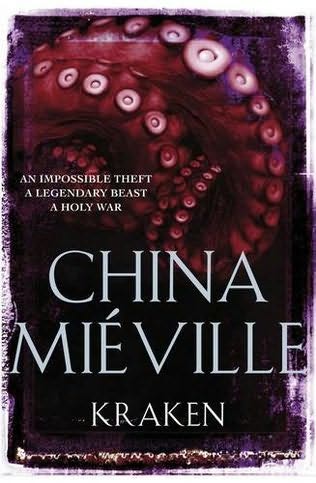
I did not know what to expect when I ordered Kraken for my personal library; although knowing it was classed as urban fantasy did tickle my curiosity. As a genre I am not entirely comfortable with does not negate my literary taste, and Miéville is one of my preferred authors, I opened this latest offering with cautious optimism.
What is this all about? It concerns the disappearance of a giant squid from the Natural History Museum located in London. The squid, and its very large glass container, have simply vanished. Not a whiff of evidence is left behind; it is as if the exhibit never existed. But its disappearance has a dark meaning, one that Billy Harrow – the scientist who preserved the specimen – is to quickly discover. Its theft concerns an impending Armageddon concerning cults, demon gangsters, immanent magic happenings pulsating from London and its long history, supernatural deities and ordinary people caught up in the theft’s aftermath.
I don’t want to go into too much detail as I feel to do so would completely give away the plot. I will give this novel’s strong points and weak points.
Weak points:
1 - The storyline is frustratingly peppered with too many ancillary characters that pop in and out with reckless abandon. Far too often there is a frenetic affair awash with tense and emotive scenes which threaten to bloody the pages. Juxtapose this with the following chapter involving a secondary character trying not to get lost while they navigate the streets of London.
2 - The language used by the locals’ grates. Though undoubtedly accurate, I found myself tiring of the kitsch accented speech and overuse of profane vulgarities; he uses words like ‘shit’ far too often. In fact I felt this novel had more than its share of crutch words to attenuate dialogues which should have, and could have, been whittled down without any loss of believability.
Strong Points:
1 - The characterizations are simply wonderful. Those that are created to intimidate will have you averting your gaze as you read about their nastiness. Those who use magic do it with a flair that is understated but all the more powerful in its conception. Even those who have no idea about the oncoming holy war with all its ensuing danger are made aware of its happenings and history without them becoming too powerful or central to the story.
2 - This is a novel bursting with ideas and fantastic scenarios. Gods and angels exist in the urban fantasy, but only show themselves to those with knowledge of them to be gestalt entities and forgotten powers both wonderful creative and restrained with a power that need not be named.
3 - The more I read the more I cared. This novel did not strike the right chords with me for the first two hundred pages, but the more I read the less I had of this feeling that I was reading a silly novel. Yes, I did feel I was reading a silly novel which stretched what escapist fantasy (regardless of its particular genre) to its breaking point and beyond. The second half of the novel removed that feeling and brought a conclusion I was happy with. It is one I will remember as it was so unexpected.
4 - My conclusion is that this is a good novel masquerading as a great novel. It takes some time to get into but it is worth the effort. It has an originality I admire, a seedy underbelly that darkens very slowly the further you read, an inventiveness which never ceases, but is tainted with a spluttering storyline which enervates the pace of events and their unfolding patterns to a near standstill at times. It hovers somewhere between a C+ and d a B- for me.

| Authors | Awards | Blogs |
| Fanzines | Index | Magazines |
| Publishers | Retailers | Reviews |